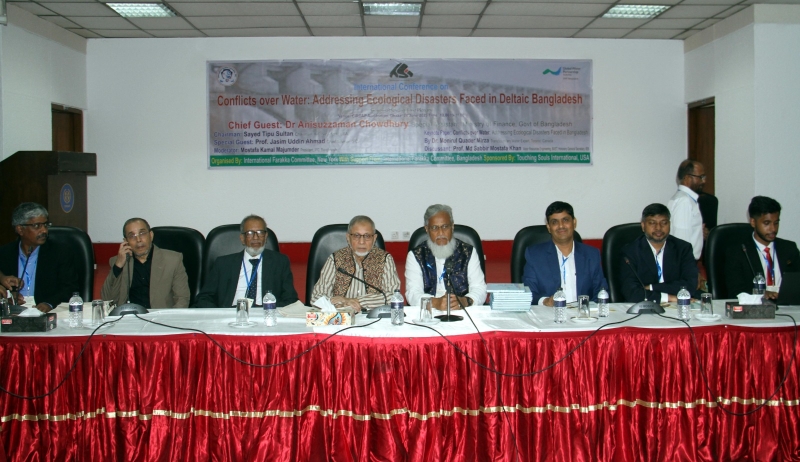- Water diversion at upstream cause ecological disasters in BD |
- India Bans Land Imports of Jute and Fabrics from Bangladesh |
- Guterres Calls for Immediate Gaza Ceasefire, Cites Crisis |
- Former CEC Nurul Huda placed on fresh 4-day remand |
- Singapore-bound Biman flight returns to Dhaka, all on board safe |
Water diversion at upstream cause ecological disasters in BD
Experts tell Int’l Conference

Anisuzzaman Chowdhury, special assistant in the Ministry of Finance addressing the international conference on ecological disasters faced in Bangladesh on Saturday at CIRDAP auditorium.
The need to assess and bring to public view the ecological disasters faced by Bangladesh due to the control of water flows in 54 common rivers originating in India was stressed at an international conference in Dhaka on Saturday.
Held at the CIRDAP auditorium, the conference called on Bangladesh to break its long silence—maintained in the name of good neighbourly relations—as ecological disasters are wreaking havoc on the country’s natural resource base. These disasters are severely affecting the economy, agriculture, fisheries, navigation, industry, forestry, wildlife, and biodiversity, forcing people to change professions and migrate from their ancestral homes.
Dr Anisuzzaman Chowdhury, Special Assistant at the Ministry of Finance, Government of Bangladesh, was the chief guest at the inauguration of the conference titled "Disputes over Water: Addressing Ecological Disasters Faced in Bangladesh." Sayed Tipu Sultan, Chairman of the International Farakka Committee, New York, presided over the session, which was moderated by Mostafa Kamal Majumder, President of IFC Bangladesh.
The day-long conference was addressed by water experts and activists from Bangladesh, Canada, Nepal, India, and the USA.
The speakers said that due to the unsustainable diversion of upstream water, areas such as the Teesta basin experience multiple waves of devastating floods, while the Meghna and Ganga basins face severe flooding at intervals. At the same time, many floodplains remain inadequately or not at all inundated during the rainy season each year. In August, an unprecedented flood hit the eastern part of the country after the gates of the Dombur water reservoir in Tripura, India, were suddenly opened without notifying lower riparian Bangladesh.
In the lean season, almost the entire country becomes dry, as water from common rivers is diverted elsewhere through dams and barrages constructed across the border—without consulting Bangladesh and without considering the dangerous downstream impacts, the speakers noted.
The experts called for multilateral arrangements for transboundary water management, emphasising that natural rivers cannot be divided by political borders. Such divisions harm not only the downstream populations but also the rivers themselves.
Five papers were presented at the conference by Dr Monirul Quader Mirza, a transboundary water expert based in Canada; Ramji Bhandari of Jalsrot Vikas Sanstha, Nepal; Advocate Ebo Mili from Arunachal, India (virtually); Prof. Saiyadur Rahman of Cumilla University; Dr Mohammad Imran Ansary; and Mehraj Akter Momen, both based in the USA.
Prof. Sirajul Islam from North South University, Siddiqur Rahman, General Secretary, and Nazmun Nahar, Coordinator of Bangladesh Water Partnership, along with Abdus Sattar Dulal from BPKS, also took part in the discussion.
The business session was chaired by Engr Shahidul Hassan, former Chief Engineer of LGED and former President of BWP, while the concluding session was chaired by Prof Jasim Uddin Ahmad, former Vice Chancellor of Jahangirnagar University and Chief Adviser of IFC Bangladesh.
The conference concluded with the adoption of a set of recommendations urging the government to take the lead in forming a UN-supervised commission with India, Nepal, Bhutan, and China to manage shared rivers transparently and equitably. It also called for a new, fair Ganges Treaty under international oversight—before the current one expires in 2026—ensuring guaranteed year-round water flow.
The recommendations further urged India to suspend its unilateral river-linking projects until the water-sharing rights of downstream countries are fully respected. They called for the establishment of a framework for coordinated river management and real-time water data sharing to prevent man-made disasters. They also advocated increasing Bangladesh’s water-holding capacity by constructing the Ganges Barrage, implementing the Teesta River Management Project, and maintaining all rivers through proper dredging and the construction of water reservoirs.
The conference called on the government to assess these disasters and bring them to public attention both nationally and internationally.
It noted that the water available in the common rivers flowing through Bangladesh is inadequate to maintain the ecological health of the rivers themselves, let alone meet the water demands of various economic sectors.
Finally, it called for a multilateral, region-based approach to sustainably manage the rivers flowing from the Himalayas, ensuring that all co-basin countries benefit equitably, while maintaining sufficient water flow for the rivers themselves before they reach the sea.

